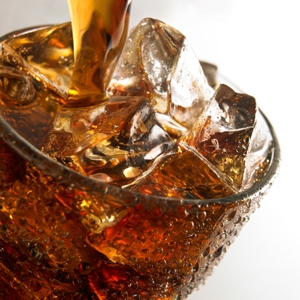I see story after story these days about how contemporary kids are, as a rule, overweight or obese. And that leads to them being fat teens and adults. But I’ve stumbled across only one study that suggests how the kids get fat in the first place. Seems it can all be traced back to the cradle…
 Yah, baby! A toddler tries Soda for the fist time, is instantly hooked! Sugar-
Yah, baby! A toddler tries Soda for the fist time, is instantly hooked! Sugar-
sweetened Soda typically contains as much as 10 tsp. of Sugar per
355 ml can. Toddlers should get no more than 6 tsp. per day.
There was a time, before baby formula and Sugar Sweetened Beverages (SSBs), that overweight kids were a rarity rather than the rule. And therein may loi8e the genesis of the 21st Century phenomenon known as Childhood Obesity.
Researchers have only just recently thought to study how infant and toddler eating habits to see if they could determine what might predispose a kid to be fat in later childhood and the teens.
What they did
The investigators analyzed data for 1,211 infants and toddlers (6-23 months) from the National Health and Nutrition Examination Survey (NHANES) 2011-2016, a nationally representative study conducted by the US Centers for Disease Control and Prevention. They used the Food Patterns Equivalents Database and the United States Department of Agriculture’s What We Eat In America list to categorize foods.
What they found
Survey results showed that nearly two-thirds of infants (61 percent) and almost all toddlers (98 percent) consumed added sugars in their average daily diets, primarily in the form of flavored yogurts (infants) and fruit drinks (toddlers). Infants were 6-11 months, and toddlers were 12-23 months.
“Our study, which is the first to look at trends in added sugars consumption by infants and toddlers, documents that most infants and toddlers consume added sugars. This has important public health implications since previous research has shown that eating patterns established early in life shape later eating patterns,” revealed Lead Investigator Dr. Kirsten A. Herrick of the National Center for Health Statistics, Centers for Disease Control and Prevention, U.S.A.
“Previous research into the diets of children over two years old associated sugar consumption with the development of cavities, asthma, obesity, elevated blood pressure and altered lipid profiles.”
The takeaway
Health organizations in the United States publish guidelines that recommend limiting sugar intake to 9 tsp. / 90 ml or less for adult men, and 6 tsp. / 60 ml or less for adult women and children between 2 and 19. With no comparable research available for infants and toddlers prior to this study, only one organization, the American Heart Association, provided any guidance for children under age 2.
“Our study’s findings about infant and toddler diets should raise awareness among health organizations and practitioners and inform future guidelines and recommendations,” Herrick added.
My take
Adding Sugar to infants’ and toddlers’ food has been a pervasive issue for at least a hundred years. And it’s not just food. Has anybody op0ut there not hears Julie Andrews croon, “Just a spoonful of sugar helps the medicine go down…”?
In my narrow, un-PhD’ed view, the issue lies with the parents, who have resorted to adding Sugar to anything they feed their infants and toddlers, just to get the kids to eat it. We now know that humans are hard-wired through evolution to crave Fat, Salt and – most insidiously – Sugar. Until the past couple of decades, that’s been just a notion among the populace, though a guiding rule for the makers of processed foods who lace their products with all three of those potentially dangerous substances to make them more palatable – even addictive. Now science has stepped in and quantified the effects, and we’re al hyper aware of it.
As I hinted somewhere above, it’sents to ensure that kids get a minimum of added sugars – especially through convenient, inexpensive, highly desirable SSBs – through their infant and toddler phases. Heck, not developing a taste (or addition to) added sugar might even help keep kids slimmer and healthier during their school years and teens! Maybe even through their whole lives…
~ Maggie J.

